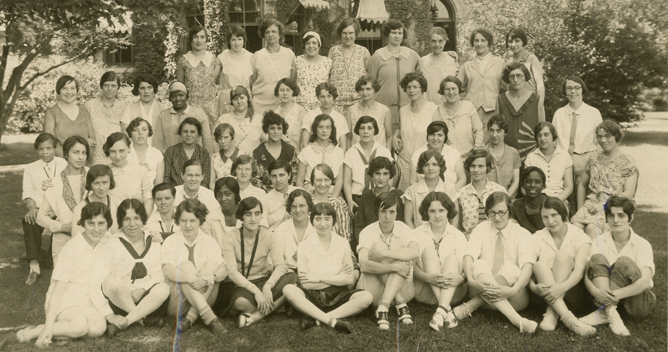Sampler Archive Project and the History of Women’s Education
Speaker Bio
Dr. Lynne Anderson is professor of education at the University of Oregon and Director of the Sampler Archive Project, an NEH funded project awarded to the University of Delaware to create an online searchable database for information and images of all known American samplers and related girlhood embroideries (17th to 19th centuries). Dr. Anderson is an internationally recognized scholar in the field of educational technology, and an emerging scholar on historic schoolgirl needlework. Her most recent publication is Samplers International: A World of Needlework (2011). She is also editor of Columbia's Daughters: Girlhood Embroidery from the District of Columbia (2012).
Dr. Patricia Keller is Curator of Digital Collections for the Sampler Archive Project, funded by an NEH award to the University of Delaware to create a searchable online database of images and information concerning American needlework samplers and related girlhood embroideries (17th to 19th centuries.) Pat's research includes organizing community-based textile documentation projects and integrating the results with more traditional historical sources. Through digitally-aided analysis of approx. 3000 period household inventory records, Pat's dissertation (University of Delaware, 2007) examines the ethnically-varied trajectories of textile production and consumption activities among town and rural households of varying ethnicity and socio-economic standing in Lancaster County, Pennsylvania (1725 - 1874). As Curator for Berrett Conservation Studio, Pat consults with historic house museums and other public heritage sites about preventative conservation activities, collections management, and curatorial practice.
Abstract
For centuries, the most critical and consistent component of women's education was instruction in needlework techniques. Knowledge of the "needle arts" was essential for clothing the family, as well as furnishing and decorating a home. Until mid 19th century, it was customary for girls and young women attending school to demonstrate and document their expanding needlework accomplishments in a series of projects. These include embroidered samplers with alphabets and verses; family records listing names, births, deaths and marriages; and pictorial scenes from the Bible or Greek classics. Many thousands of these school documents have been preserved - treasured across generations, or pulled into collections by cultural heritage institutions such as museums and historical societies
The Sampler Archive Project is an NEH-funded initiative to create a publically accessible online database of information and high-resolution images of all known American samplers and related schoolgirl embroideries. The project is currently working with four major museums to create documentation standards and protocols, and then populate the online database with descriptive information and images for approximately 600 American samplers, which will soon be expanded to 3000. The project's goal is to promote scholarship related to women's history, material culture, and regional decorative arts.
Sampler Archive Project and the History of Women’s Education
For centuries, the most critical and consistent component of women's education was instruction in needlework techniques. Knowledge of the "needle arts" was essential for clothing the family, as well as furnishing and decorating a home. Until mid 19th century, it was customary for girls and young women attending school to demonstrate and document their expanding needlework accomplishments in a series of projects. These include embroidered samplers with alphabets and verses; family records listing names, births, deaths and marriages; and pictorial scenes from the Bible or Greek classics. Many thousands of these school documents have been preserved - treasured across generations, or pulled into collections by cultural heritage institutions such as museums and historical societies
The Sampler Archive Project is an NEH-funded initiative to create a publically accessible online database of information and high-resolution images of all known American samplers and related schoolgirl embroideries. The project is currently working with four major museums to create documentation standards and protocols, and then populate the online database with descriptive information and images for approximately 600 American samplers, which will soon be expanded to 3000. The project's goal is to promote scholarship related to women's history, material culture, and regional decorative arts.
